SurveyMonkey Review
SurveyMonkey is a leading online survey platform that allows users to create, distribute, and analyze surveys with ease. Founded in 1999, it has evolved into a comprehensive tool used by businesses, researchers, and individuals to gather feedback and insights.
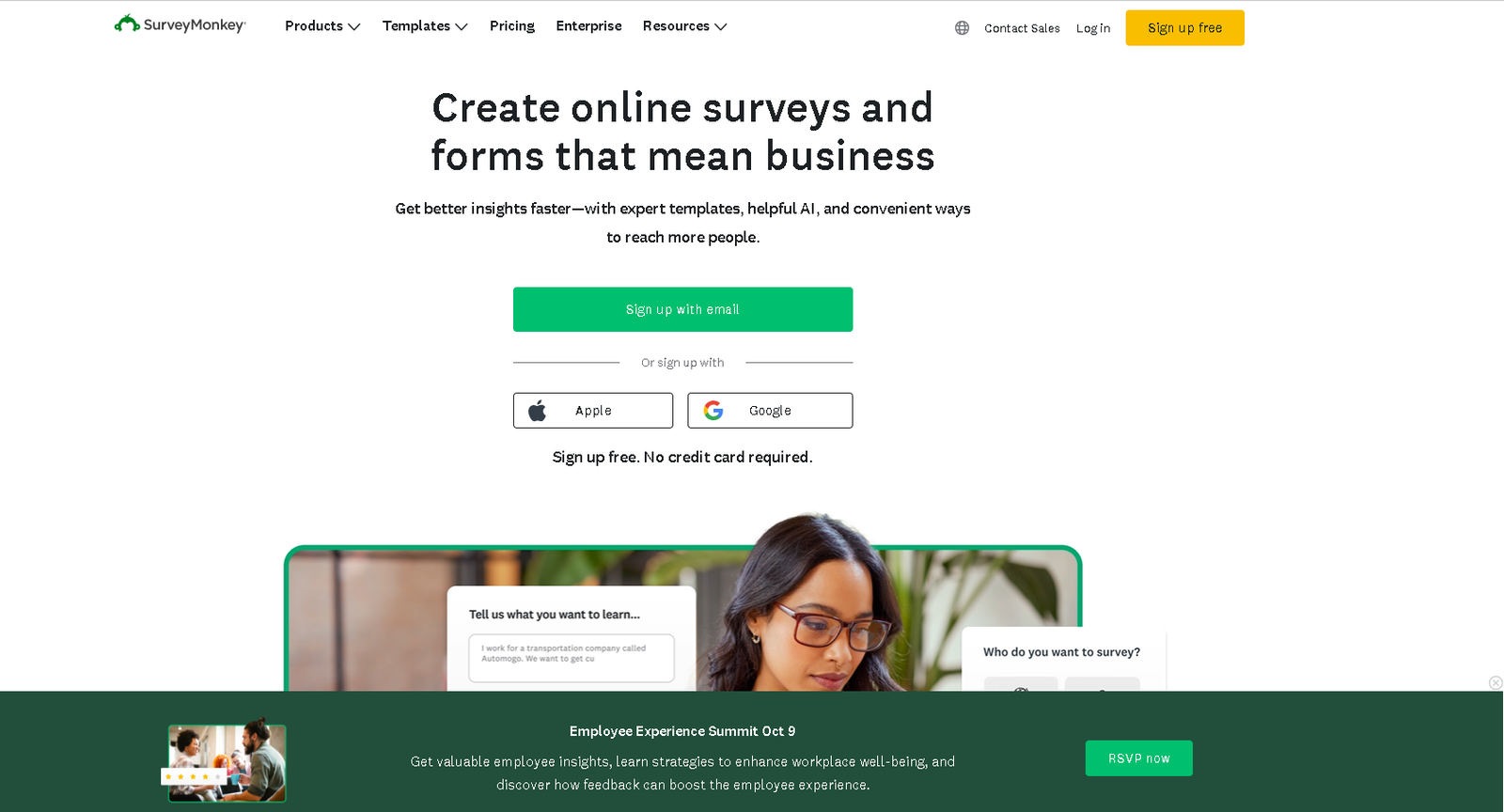
SurveyMonkey provides various templates and question types, enabling users to customize their surveys to suit specific needs. Its versatility makes it suitable for market research, customer satisfaction assessments, event planning, and more.
One of the platform’s key strengths is its robust analytics capabilities. After collecting responses, users can leverage real-time data analysis tools to interpret results quickly. SurveyMonkey offers features such as data visualization, reporting options, and integration with other software like CRM systems, making it easier to transform raw data into actionable insights. This empowers organizations to make informed decisions based on the feedback gathered.
Additionally, SurveyMonkey emphasizes security and compliance, ensuring that user data is protected. It complies with various regulations, including GDPR, making it a trusted choice for businesses that prioritize data privacy. Whether for academic research, employee engagement, or customer feedback, SurveyMonkey provides a reliable solution to gather and analyze information efficiently, helping users make data-driven decisions with confidence.
4.6
Pricing
PREMIER ₹9153
ADVANTAGE ₹3513
STANDARD ₹3606
Ranked 6 from 29 Form Builders
Performance: |4.9|
SurveyMonkey is known for its user-friendly interface and robust survey creation tools. It offers various question types and customizable templates, making it suitable for both simple and complex surveys. The platform generally performs well, handling multiple responses efficiently.
Uptime: |4.9|
SurveyMonkey typically maintains high uptime rates, ensuring that users can access the platform without interruptions. While specific uptime statistics can fluctuate, the service is generally reliable, with any downtime usually communicated promptly.
Customer Service: |4.8|
SurveyMonkey offers several customer support options, including a knowledge base, email support, and live chat for premium users. While many users find the resources helpful, response times can vary, especially during peak usage times.
Pricing: |4.7|
SurveyMonkey has a tiered pricing structure:
Basic (Free): Limited features with access to basic survey tools.
Individual Plans: Paid options that unlock more advanced features, such as data analysis and custom branding.
Team Plans: Designed for businesses, offering collaborative tools and enhanced reporting capabilities.
Overview
Category | Details |
Founded | 1999 by Ryan Finley |
Services Offered | – Survey creation tools – Templates – Data analysis and reporting – Integrations – Custom branding options |
Pricing | – Basic (Free): Limited features – Individual Plans: Starting around $32/month – Team Plans: Pricing varies based on size and features |
Customer Support | – Help center with articles – Email support – Live chat for premium users – Community forums |
Ease of Use | Intuitive interface with drag-and-drop functionality and pre-built templates |
Performance | Generally high performance with fast loading times and ability to handle large volumes of responses |
Reputation | Solid reputation for reliability and feature-rich offerings; widely used across various sectors |

Comprehensive Form Builder with a Free Option
SurveyMonkey is one of the most widely-used online form builders, trusted by over 6,700 businesses for market research and customer satisfaction tracking. It supports more than 15 languages, including German, French, Korean, and Japanese, and offers an intuitive interface. SurveyMonkey provides a robust selection of features, including extensive data analysis tools, pre-designed forms, and 13 different question types.
You can choose from individual or team plans, or opt for the free basic plan to access a selection of SurveyMonkey’s features. No credit card is required for the free plan, making it easy to test out.
TEMPLATES |4.9| 





Customizable Templates with Preset Styles and More
SurveyMonkey offers a wide selection of templates, ranging from market research surveys to fun quizzes. Each template comes with expert-designed questions, which you can easily replace with your own.
What sets SurveyMonkey’s templates apart is the extensive customization available after selecting a template. You can manually adjust colors, layout, and background, or choose from over 15 themes that automatically apply stylish designs and color schemes to your form.

There are over 180 templates available with paid plans, but the free plan only provides access to 40 shorter survey templates. Customization options are also restricted on the free plan.
SurveyMonkey offers 13 template categories, such as customer feedback, demographics, market research, political surveys, and fun quizzes. You can easily filter templates by category.
FEATURES |4.7| 




Survey Creation Tools: User-friendly interface with various question types, including multiple choice and open-ended questions.
Templates: Access to a wide range of pre-built survey templates tailored for different purposes, such as customer feedback and employee engagement.
Data Analysis: Real-time analytics and reporting features that allow users to visualize data through charts and graphs.
Customization Options: Ability to brand surveys with logos, colors, and custom URLs for a personalized experience.
Integrations: Connects seamlessly with other platforms, including CRM and email marketing tools, to streamline workflows.

A Growing Collection of Powerful Features
SurveyMonkey is packed with features, and new ones are regularly added to enhance your ability to collect and analyze business data.
It integrates seamlessly with platforms like Shopify for e-commerce, Hootsuite for social media, and Mailchimp for email marketing. SurveyMonkey also connects to hundreds of apps via Zapier, allowing automations like creating new Google Sheets entries for each form submission.
When designing your forms, you can use tools like Image Choice (for feedback on images or products) or Net Promoter Score (to gauge how likely customers are to recommend you), and access a large library of expertly crafted questions.
However, note that the free version of SurveyMonkey is quite limited, lacking advanced features like logic, custom question banks, and payment integrations.
SurveyMonkey Genius
This AI-powered tool, based on survey expert insights, helps streamline market research and data collection. SurveyMonkey Genius can suggest the best question types (e.g., multiple choice, text field) and improve survey efficiency.
Other key features include a scoring tool that evaluates your survey and offers improvement suggestions, an estimator of survey success, and a tool that assists in crafting the best response options for scale-type questions.
Custom Question Bank
If you’re part of a research team, the custom question bank is invaluable. It allows you to store and share pre-written questions with teammates, ensuring consistency in survey language and style, while also saving time during survey creation.
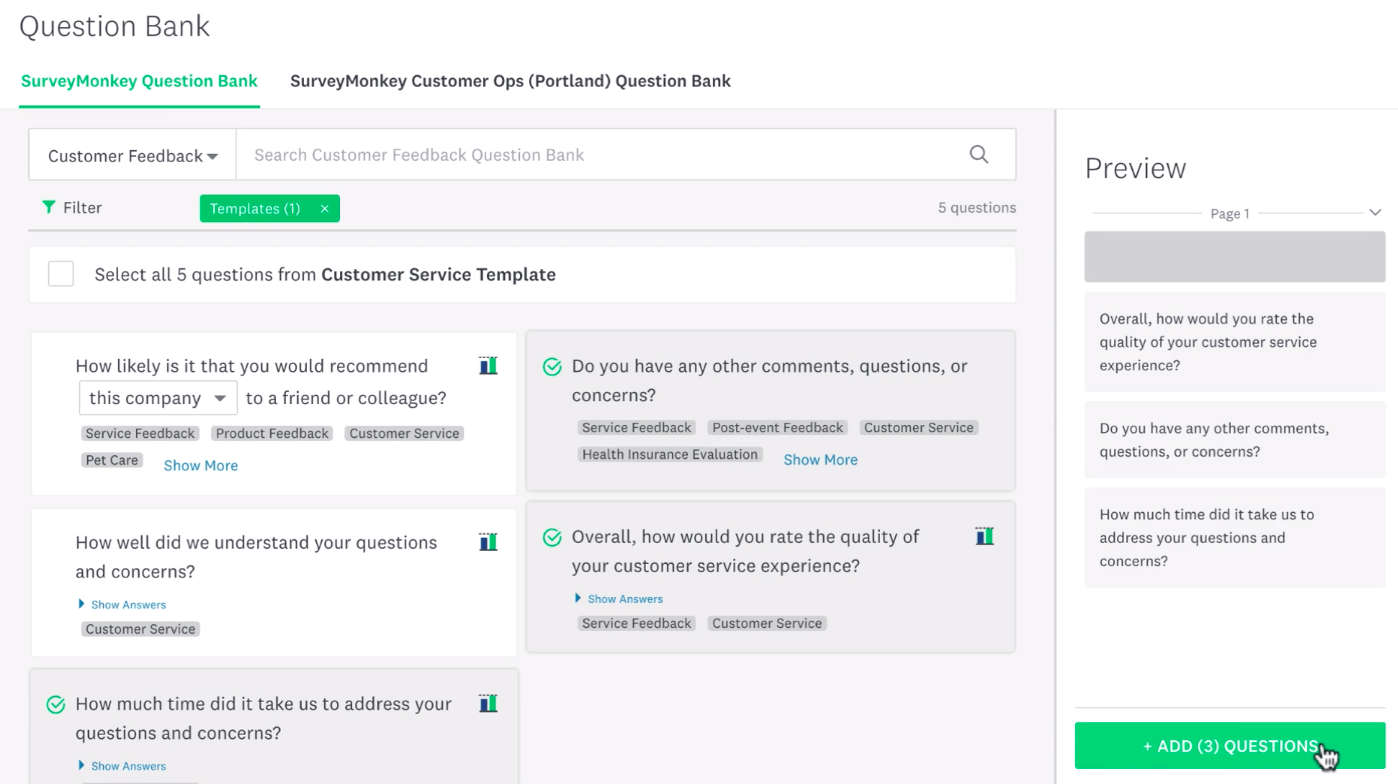
Popular Form Builders
Service Offered
Survey Creation: SurveyMonkey offers easy-to-use tools for designing surveys with various question types, including multiple choice and open-ended formats.
Templates: Users can access customizable templates for different purposes, such as market research and customer feedback, allowing quick and effective survey creation.
Data Collection: To maximize audience reach, surveys can be shared by social media, email, or website embedding.
Data Analysis: Real-time analytics provide insights through visualizations and customizable reports, helping users interpret data easily.
Integration Capabilities: SurveyMonkey integrates seamlessly with CRM systems and email marketing tools, streamlining workflows.
Custom Branding: Users can add logos, colors, and personalized URLs to surveys, ensuring brand consistency.
Collaboration Features: Teams can collaborate on survey design and analysis, enhancing efficiency and teamwork.
Mobile Compatibility: Surveys are optimized for mobile devices, allowing respondents to participate on-the-go.
Multilingual Support: Users can create surveys in multiple languages, reaching a broader audience.
API Access: Developers can use API access to integrate SurveyMonkey functionalities into their own applications.
PROS AND CONS OF SURVEYMONKEY
Pros of SurveyMonkey
User-friendly interface
Wide range of customizable templates
Robust analytics and reporting tools
Mobile-friendly surveys
Integration with various third-party apps
Cons of SurveyMonkey
Limited features in the free plan
Higher costs for advanced features
Some users report issues with support
Complexity in setting up advanced options
Learning curve for new users
What Is SurveyMonkey
With the help of the online survey tool SurveyMonkey, users can effortlessly develop, distribute, and evaluate surveys. It offers a variety of tools and features, including customizable templates, a wide range of question types, real-time analytics, and reporting options. The platform is designed to help individuals and organizations gather feedback, conduct research, and make informed decisions based on data.

Who Is It For?
SurveyMonkey caters to a diverse range of users, including:
Businesses: Companies use it for customer feedback, employee engagement surveys, market research, and product development.
Educators: Teachers and educational institutions can create surveys for student feedback, course evaluations, and assessments.
Nonprofits: Organizations use it to gauge community needs, donor feedback, and program effectiveness.
Event Planners: Event organizers can collect attendee feedback and preferences before and after events.
Individuals: Anyone looking to gather opinions or conduct informal surveys, such as for personal projects or hobbies.
Products and Resources
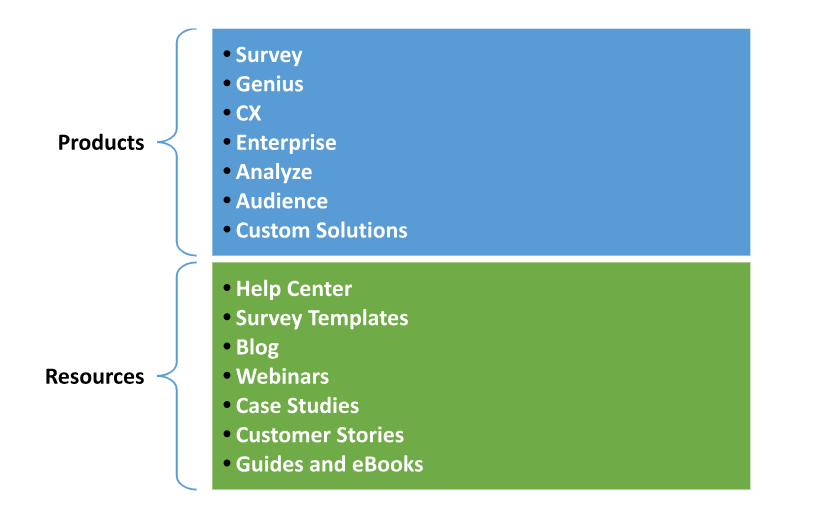
Why you should consider SurveyMonkey?
One of the key advantages of SurveyMonkey is its user-friendly interface. Designed for accessibility, it allows individuals and teams without extensive technical knowledge to create and distribute surveys with ease. This simplicity makes it an attractive option for a wide range of users.
The platform also boasts versatile features, offering a variety of question types and customization options. This flexibility enables users to tailor their surveys to meet specific needs, whether for market research, customer feedback, or event planning.
Another significant benefit is its robust analytics capabilities. SurveyMonkey provides real-time insights through visualizations and reporting tools, helping users interpret data effectively and make informed decisions based on the results.

Templates Used
Variety of Options: SurveyMonkey offers a wide range of customizable templates tailored for different purposes, such as customer feedback, employee engagement, and market research.
Ease of Use: Templates are designed to be user-friendly, allowing users to quickly create surveys without needing extensive design skills or experience.
Time-Saving: Using templates significantly reduces the time required to set up surveys, enabling users to focus on gathering insights rather than starting from scratch.
EASY OF USE |4.9| 




SurveyMonkey is designed for ease of use, featuring an intuitive interface that allows users to navigate the platform effortlessly, even without technical expertise. The drag-and-drop functionality simplifies the process of adding questions and customizing survey layouts, while a variety of pre-built templates enables users to quickly create tailored surveys without starting from scratch.
Additionally, guided prompts and tips provide helpful insights on structuring surveys effectively, and the platform’s mobile optimization ensures that respondents can easily participate from any device. Together, these features create a seamless experience, making SurveyMonkey an accessible and efficient tool for gathering feedback.
Intuitive Interface: The platform features a user-friendly design that allows users to navigate easily, making survey creation straightforward even for those without technical expertise.

Multiple Ways to Begin with SurveyMonkey
SurveyMonkey offers three methods for creating your form, making it user-friendly, though not the simplest I’ve encountered – the vast array of choices can make the process more complex. You can either start from scratch, select a pre-made template, or have the Genius AI create the form for you.
Let It Build for You The Genius AI option is by far the easiest, requiring just a few inputs (such as who you’re surveying, your survey goal, and the type of survey) before your form is automatically generated.
Builder Tooltips
While starting a new survey is straightforward, customizing your questions, adding new ones, or using the logic features makes the interface a bit more intricate.
The builder offers a wide range of options, which can feel overwhelming, but this is where the tooltips come in handy. When you hover over a block in the builder, a tooltip box appears, providing a brief explanation of what the block does and how to incorporate it into your survey.

Builder Tooltips
Starting a new survey is easy, but if you want to personalize your questions, add new ones, or explore logic functions, the interface can get more complicated.
The builder offers a vast selection of options, which can feel overwhelming. This is where the tooltips feature is particularly useful. When you hover over a block in the builder, a tooltip appears, explaining the function of the block and how to apply it to your survey.

Drag and Drop
Designing your form from scratch, instead of using a template, is simplified by SurveyMonkey’s drag-and-drop interface. You can select a block from the Builder tools, drag it onto your survey, and then customize the details.

Getting started with SurveyMonkey

Create an Account: Sign up for a free account on the SurveyMonkey website to access basic features or choose a paid plan for advanced tools.
Choose a Template: Select from a variety of customizable templates tailored for different purposes, such as customer feedback or market research, to simplify the survey creation process.
Design Your Survey: Use the intuitive drag-and-drop interface to add questions, customize layouts, and apply branding elements like logos and colors.
Distribute Your Survey: Once your survey is ready, share it through various channels such as email, social media, or by embedding it on your website to reach your target audience.
Analyze Responses: After collecting responses, use the built-in analytics tools to view results, generate reports, and gain insights to inform your decisions.
GTMetrix
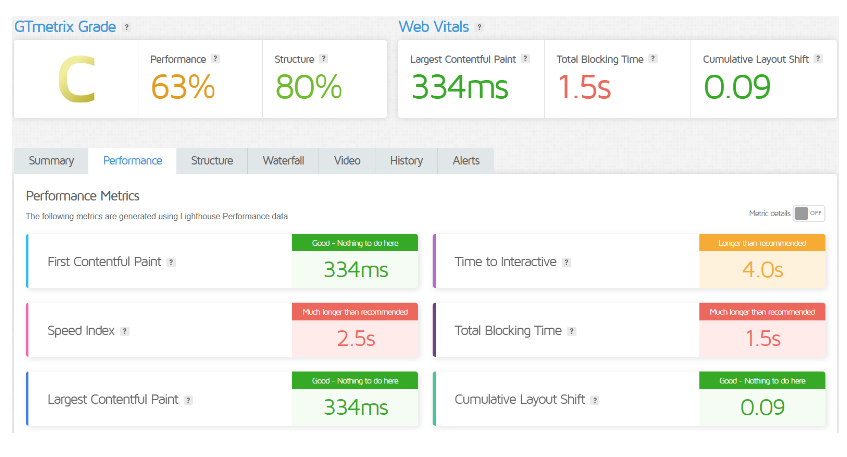
SUPPORT |4.7| 





Help Center: Visit the SurveyMonkey Help Center for articles on common questions, features, and troubleshooting tips.
Contact Support: If you can’t find what you need, you can submit a support request directly through their website.
Community Forums: Check out their community forums for discussions and tips from other users.
Live Chat/Email: Depending on your subscription plan, you may have access to live chat or email support.
Security
SurveyMonkey takes security seriously, implementing a range of measures to protect user data and ensure privacy. The platform utilizes encryption both in transit and at rest, safeguarding sensitive information from unauthorized access. This means that any data sent between users and the SurveyMonkey servers is encrypted, making it difficult for potential attackers to intercept and decipher.
In addition to encryption, SurveyMonkey adheres to industry standards and regulations, including GDPR and CCPA, which govern data protection and privacy rights. This compliance helps ensure that users’ personal information is handled responsibly and transparently. The company also offers various security features for enterprise users, such as advanced authentication options, IP restrictions, and user permissions, allowing organizations to control access and manage data securely.
Furthermore, SurveyMonkey conducts regular security assessments and audits to identify and mitigate potential vulnerabilities. This proactive approach helps maintain the integrity of the platform and instills confidence in users regarding the safety of their data. Overall, SurveyMonkey’s commitment to security provides users with the assurance that their surveys and responses are protected.

Review
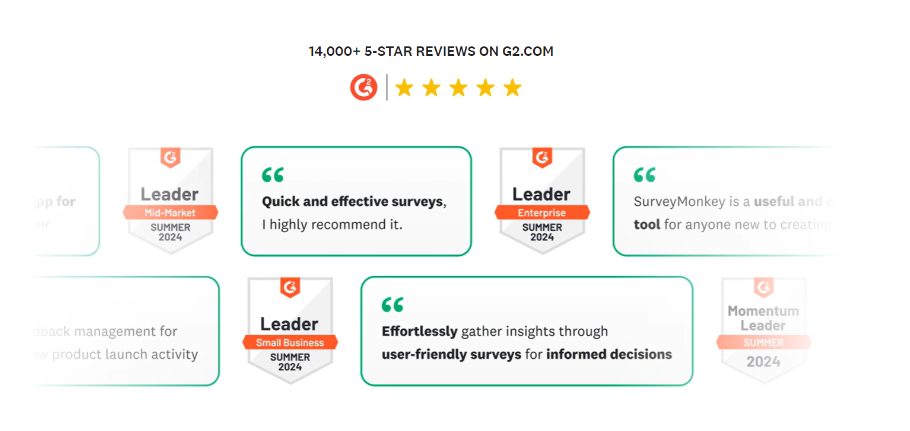
PRICING |4.1| 




Plan | Monthly Cost | Features |
Basic | Free | Limited features, basic surveys, and data analysis |
Individual Plans | Starting at ₹1,999/month | Advanced features, custom branding, and enhanced reporting |
Team Plans | Starting at ₹1,550/ month | Collaboration tools, team management, and comprehensive analytics |
Enterprise | Custom pricing | Advanced security, dedicated support, and customization options |

SurveyMonkey’s pricing structure can be a bit confusing, so it’s essential to verify the plan you’ve chosen before completing your purchase. There’s a free Basic plan, three individual plans (Standard, Advantage, and Premier), and three team plans (Team Advantage, Team Premier, and Enterprise).
The free Basic plan comes with several limitations, including:
Unlimited surveys
A maximum of 10 questions per survey
Viewing up to 100 responses per survey
Up to three distribution methods (e.g., email, weblink, social media) per survey
Access to 40 short survey templates
The Standard (individual) plan offers a monthly payment option, but its fees are relatively higher than the Advantage plan. In contrast, the Advantage plan provides more features and allows unlimited responses, though it requires annual billing. The Standard plan limits responses to 1,000 and does not support payment acceptance.
Be cautious of automatic billing, as some customers have reported being charged monthly fees even after canceling their subscriptions.
SurveyMonkey
PREMIER
₹9153
/MONTHS
SurveyMonkey
ADVANTAGE
₹3513
/MONTHS
SurveyMonkey
STANDARD
₹3606
/MONTHS
SurveyMonkey
PREMIER
₹9153
/MONTHS
SurveyMonkey
ADVANTAGE
₹3513
/MONTHS
SurveyMonkey
STANDARD
₹3606
/MONTHS
SurveyMonkey Alternatives
Frequently Asked Question.
Yes, SurveyMonkey offers a free plan with limited features. Paid plans provide more advanced options.
You can create multiple-choice, rating scale, open-ended, and other question types.
Yes, you can customize your survey with colors, logos, and themes, especially in paid plans.
Your survey may be shared by social media, email, or website embedding.
Yes, SurveyMonkey provides various analysis tools, including charts, graphs, and summary statistics.
Surveys can be as long as you need, but keep in mind that shorter surveys generally yield higher response rates.
Yes, you can set your survey to collect responses anonymously.
Yes, SurveyMonkey uses industry-standard security measures to protect your data.
SurveyMonkey integrates with various tools, including Google Drive, Mailchimp, and Salesforce.
You can upgrade your plan directly from your SurveyMonkey account settings.
Yes, you can export your results in formats like CSV, PDF, and Excel, depending on your plan.
Yes, SurveyMonkey offers customer support through email and live chat, especially for paid users.







